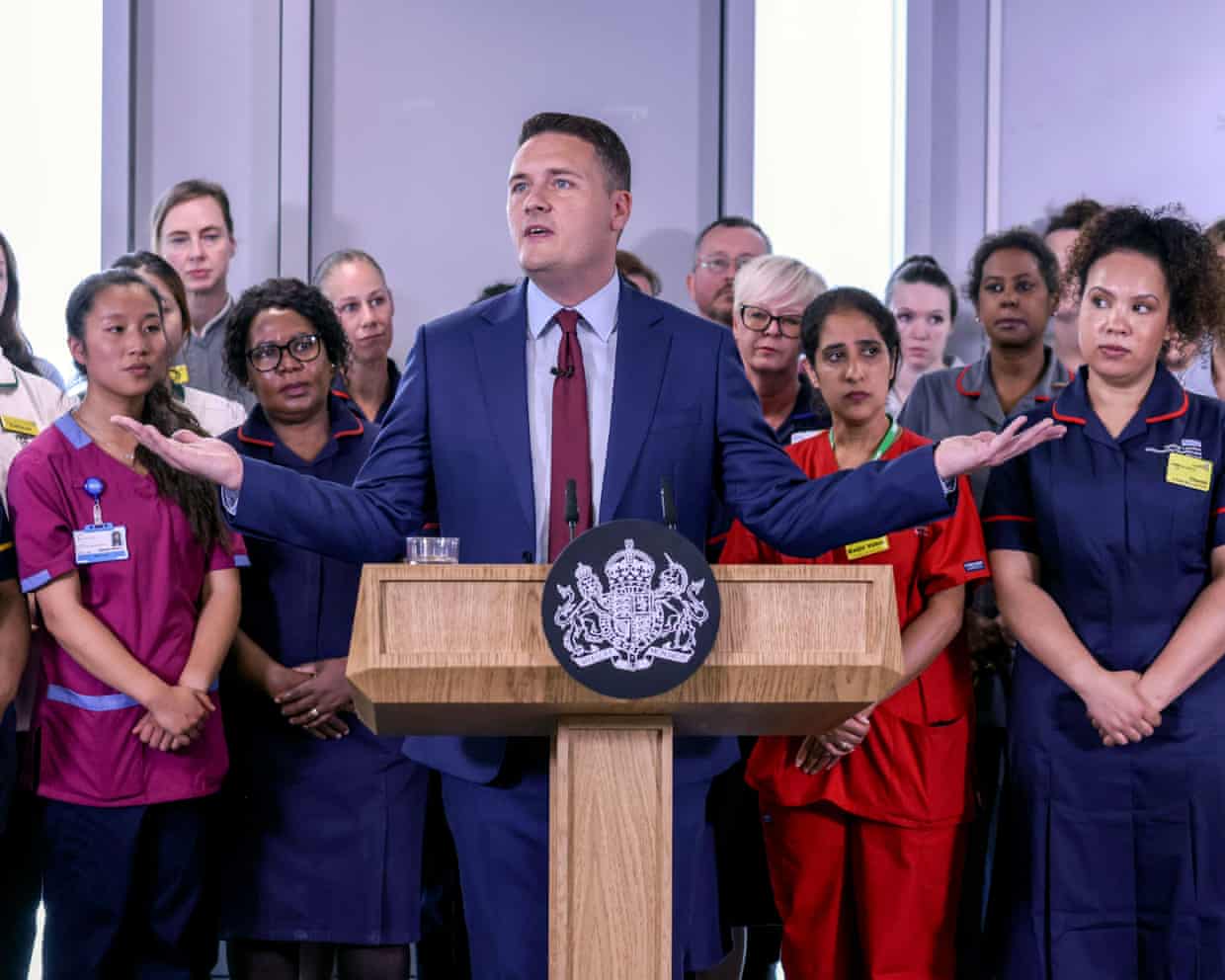Health
Wes Streeting’s NHS Reforms: A Gamble for Labour’s Future

The future of the National Health Service (NHS) in the UK hinges on the success of reforms proposed by Wes Streeting, the Secretary of State for Health and Social Care. Streeting’s ambitious plan aims to reduce NHS waiting lists, which have become a pressing concern for many Britons, while also addressing the structural issues within the healthcare system. Recent polling from the Health Foundation reveals that public awareness of improvements in waiting times remains low, with only a quarter of respondents acknowledging a decline in waiting lists during Labour’s first year in power.
This week, Streeting announced plans to eliminate approximately 18,000 backroom jobs within the NHS, with the goal of saving £1 billion annually for frontline care. While this reorganisation is intended to streamline operations and improve patient care, it comes at a significant upfront cost. The announcement has raised concerns, particularly as staff face the prospect of job losses before the holiday season.
Streeting’s reforms are particularly high-stakes, as they unfold against the backdrop of ongoing challenges, including doctors’ strikes and delays in social care reform. The NHS remains under pressure, with hospitals still accommodating patients who do not necessarily require hospitalisation. The success of these reforms is crucial not only for the NHS but also for the Labour government, which needs to demonstrate tangible improvements to regain public trust.
Challenges and Opportunities Ahead
The urgency of addressing long NHS waiting times cannot be overstated. According to the latest figures, 61.8% of patients are currently treated within 18 weeks of referral, with NHS executives projecting this could rise to 65% by March 2024. The target of 92%—previously achieved under the Blair government—remains a long-term goal, set for 2029.
Despite this progress, the situation remains fragile. Streeting expressed frustration over the British Medical Association’s (BMA) stance on doctors’ salaries, particularly as they prepare for further strikes following a 28.9% pay rise last year. The relationship between the government and medical professionals is crucial; without their support, the proposed reforms may falter.
Streeting’s strategy involves reducing bureaucratic roles that are unpopular among the public and reallocating those resources to frontline services. This includes merging NHS England back into the Department of Health and Social Care, which could provide more autonomy to successful hospital trusts. Such changes might reflect a broader trend in government, where other departments are also exploring devolution and new technologies to enhance service delivery.
Navigating a Complex Landscape
The potential job losses within the NHS are not just numbers; they represent real individuals—patient safety officers, infection control specialists, and administrative staff—who have played a vital role during the pandemic. If the reforms lead to improved patient outcomes, they may ultimately justify the immediate pain of job cuts. Conversely, if the changes do not yield the expected results, public frustration could deepen, damaging the Labour Party’s credibility.
Streeting’s challenge is monumental: to implement necessary reforms within a limited budget while convincing both the public and healthcare professionals that the changes will lead to better outcomes. Historical precedents exist, as the last Labour government successfully increased NHS appointments. Current modelling by the Health Foundation suggests Streeting might come close to achieving his targets, but the path forward will require navigating a complex political landscape filled with resistance from various stakeholders.
As Streeting balances these competing pressures, his ability to maintain a sense of humour—evidenced by his light-hearted remarks during public engagements—might serve him well. If he can successfully execute these reforms, he may not only solidify his position within the Labour Party but also reshape the future of the NHS, proving that government action can indeed make a meaningful difference. The coming months will be critical in determining whether Streeting’s gamble pays off.
-

 Science4 weeks ago
Science4 weeks agoInterstellar Object 3I/ATLAS Emits Unique Metal Alloy, Says Scientist
-

 Science4 weeks ago
Science4 weeks agoResearchers Achieve Fastest Genome Sequencing in Under Four Hours
-

 Politics4 weeks ago
Politics4 weeks agoAfghan Refugee Detained by ICE After Asylum Hearing in New York
-

 Business4 weeks ago
Business4 weeks agoIconic Sand Dollar Social Club Listed for $3 Million in Folly Beach
-

 Health4 weeks ago
Health4 weeks agoPeptilogics Secures $78 Million to Combat Prosthetic Joint Infections
-

 Business4 weeks ago
Business4 weeks agoMcEwen Inc. Secures Tartan Lake Gold Mine Through Acquisition
-

 Lifestyle4 weeks ago
Lifestyle4 weeks agoJump for Good: San Clemente Pier Fundraiser Allows Legal Leaps
-

 Science4 weeks ago
Science4 weeks agoMars Observed: Detailed Imaging Reveals Dust Avalanche Dynamics
-

 Health4 weeks ago
Health4 weeks agoResearcher Uncovers Zika Virus Pathway to Placenta Using Nanotubes
-

 World4 weeks ago
World4 weeks agoUS Passport Ranks Drop Out of Top 10 for First Time Ever
-

 Entertainment4 weeks ago
Entertainment4 weeks agoJennifer Lopez Addresses A-Rod Split in Candid Interview
-

 Business4 weeks ago
Business4 weeks agoSan Jose High-Rise Faces Foreclosure Over $182.5 Million Loan








